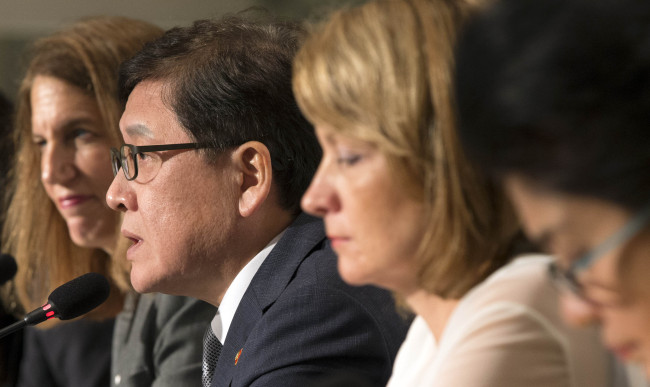Health Ministers from four countries, including Korea, Wednesday announced 11 global health security action packages to better prevent and respond to infectious diseases threats worldwide at the Global Health Security Agenda High-Level Meeting held in Seoul. The other ministers were from the U.S., Finland and Indonesia.
The event, attended by public health authorities from 47 countries as well as the World Health Organization, was held about a month after Korea announced the de facto end to its Middle East respiratory syndrome outbreak. The health crisis claimed 36 lives here.
The announcement of the action packages came a day after Korean President Park Geun-hye shared her plans to spend $100 million to support 13 developing countries to fight infectious disease in the next five years.
 |
| South Korean Health Minister Chung Chin-youb (second from left) speaks during a press conference in Seoul on Wednesday. Yonhap |
“Recent global outbreaks have enlightened the world that infectious diseases are not solely a public health problem of developing countries,” the announcement of the action packages, officially titled the Seoul Declaration, said.
“Rather, public health crisis can have serious social, economic, and political implications on a national, regional and international scale. Therefore, global health security should be understood as a shared, multisectoral responsibility that no single country, organization or sector can achieve alone in every area of our lives.”
The 11 action package targets include antimicrobial resistance, zoonotic disease, biosafety and biosecurity, immunization, a national laboratory system, real-time surveillance, reporting, workforce development, emergency operations centers, linking public health law and multisectoral rapid response and medical countermeasures and personnel deployment.
Upon the release of the declaration, each and every participating country vowed to eventually provide at least one dose of a measles-containing vaccine to 95 percent of their 15-month-old population and establish a public health emergency operations center to better detect public health emergencies. Korea recently announced the formation of such an agency as the nation’s post-MERS plan to better deal with infectious disease threats.
The declaration also recommended the participating country have at least one trained field epidemiologist for every 200,000 people.
The Korean government had been heavily criticized for its initial response to the MERS outbreak earlier this year, especially for refusing to share the list of MERS-affected hospitals for more than two weeks after the index case was confirmed in May. The Seoul Declaration required participating countries to adopt timely and accurate disease reporting according to WHO requirements.
On Monday, Thomas Frieden, director of the U.S. Centers for Disease Control and Prevention, stressed the importance of timely and transparent information release when dealing with health emergencies.
“The CDC is one of the most trusted organizations in the country (the U.S.),” he said. “And that’s because people know we are going to tell the truth even if it’s going to make them feel uncomfortable. … And if we don’t know something we are not afraid to say we don’t know and here’s how we are going to find out.”
By Claire Lee (dyc@heraldcorp.com)

